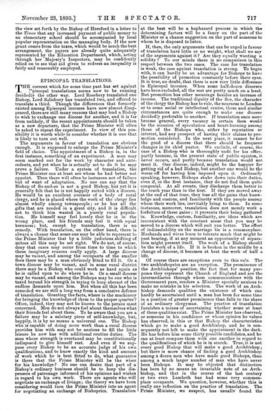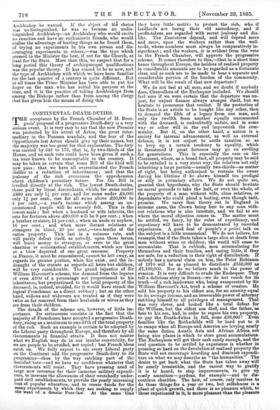EPISCOPAL TRANSLATIONS. T HE current which for some time past has
set against rpiscopal translations seems now to be running decidedly the other way. Lord Rosebery translated one Bishop, Lord Salisbury has translated two, and offered to translate a third. Though the differences that formerly existed among Episcopal incomes have now almost disap- peared, there are still many reasons that may lead a Bishop to wish to exchange one diocese for another, and it is far from unlikely, if the recent appointments should be taken as a new departure, that the Prime Minister will often be asked to repeat the experiment. In view of this pos- sibility it is worth while to consider whether it is one that is likely to turn out well. The arguments in favour of translation are obvious enough. It is supposed to enlarge the Prime Minister's field of choice. The appointment of a Bishop is, in the first instance, something of an experiment. A man may seem marked out for the work by character and ante- cedents, and yet when he is actually set to do it he may prove a failure. Under a system of translation, the Prime Minister can at least see whom he had better not appoint. Then there will often be instances not of failure but of want of adaptation. No one can say that the Bishop of So-and-so is not a good Bishop, but yet it is generally felt that he is not happily suited with a diocese. He would be an excellent overseer of a body of rural clergy, and he is placed where the work of the clergy lies almost wholly among townspeople ; or he has all the gifts that are needed in a great city, and it is difficult not to think him wasted in a purely rural popula- tion. He himself may feel keenly that he is in the wrong place, and his friends may feel it with equal keenness ; but, except by translation, there is no remedy. With translation, on the other hand, there is always a chance that some one may be able to represent to the Prime Minister that by a little judicious shifting of mitres all this may be set right. We do not, of course, deny that cases may occur from time to time to which these imaginary reasons really apply. A large diocese may be vacant, and among the occupants of the smaller Sees there may be a man obviously fitted to fill it. Or a town diocese may be vacant, and in some rural district there may be a Bishop who could work as hard again as he is called upon to do where he is. Or a small diocese may be vacant, and among the Bishops may be one who is taxed beyond his strength in trying to keep abreast of the endless demands upon him. But when all this has been conceded we are still a long way from a conclusive defence of translation. Granting the facts, where is the machinery for bringing the knowledge of them to the proper quarter? Often, indeed, they may not be known to the person most concerned. Men do not always feel about themselves what their friends feel about them. To be aware that you are a failure may be a salutary piece of self-knowledge, but, happily, it is by no means a universal one. The Bishop who is capable of doing more work than a rural diocese provides him with may not be anxious to fill the little leisure he now has with additional routine duties. The man whose strength is overtaxed may be constitutionally indisposed to give himself rest. And even if we sup- pose every Bishop to be an accurate judge of his own qualifications, and to know exactly the kind and amount of work which he is best fitted to do, what guarantee is there that the Prime Minister will be the wiser for his knowledge? No one can desire that part of a Bishop's ordinary business should be to keep the dis- pensers of patronage informed of his opinions and wishes in regard to his own work. There are agents who will negotiate an exchange of livings ; the theory we have been considering would turn the Prime Minister into an agent for negotiating an exchange of Bishoprics. Translation at the best will be a haphazard process in which the determining factors will be a fancy on the part of the Minister or a chance suggestion on the part of someone to whom he is disposed to listen.
If, then, the only arguments that can be urged in favour of translation have little or no weight, what shall we say of the arguments against it? Are they equally wanting n solidity ? To our minds there is no comparison in this respect between the two cases. The case for translation is weak, the case against translation is strong. To begin with, it can hardly be an advantage for Bishops to have the possibility of promotion constantly before their eyes. It is true, no doubt, that there is now very little difference in Episcopal incomes. When some half-dozen dioceses have been excluded, all the rest are pretty much on a level. But promotion has other meanings besides an increase of income. The traditional dignity of the See, the character of the clergy the Bishop has to rule, the nearness to London or to some social or intellectual centre, these and similar circumstances are quite enough to make one diocese decidedly preferable to another. If translation once more became general, every vacancy in certain Sees would be the occasion of speculation and heart-burning among those of the Bishops who' either by reputation or interest, had any prospect of having their claims to pro- motion considered. In the next place, it cannot be for the good of a diocese that there should be frequent changes in its chief pastor. We exclude, of course, the case of a Bishop who is thoroughly unfit for his office, partly because, in the present state of public opinion, it never occurs, and partly because translation would not meet it. One diocese, indeed, might be the happier for getting rid of a bad Bishop, but another one would be the worse off for having him imposed upon it. Ordinarily speaking, however, Bishops shake down into their duties, even if, in the first instance, they do not find them quite congenial. At all events, they discharge them better in the tenth year than in the first. If they are moved away at the end of that time, they lose all the gains that know- ledge and custom, and familiarity with the people among whom their work lies, inevitably bring to them. In some instances, moreover, translation does not merely work a forfeiture of these gains ; it prevents their being gathered in. Knowledge, custom, familiarity, are ideas which are inconsistent with the constant sense that you may be moved to a diocese which will suit you better. The effect of indissolubility on the marriage tie is a commonplace. Husbands and wives learn to tolerate much that might be past bearing, if at any moment an opportunity of separa- tion might present itself. The work of a Bishop should be the work of a life. If it is broken in the middle by a change of diocese, it becomes at best the work of half a life.
Of course there are exceptions even to this rule. The two archbishoprics are an exception. The prominence of the Archbishops' position, the fact that for many pur- poses they represent the Church of England and are the intermediaries through whom communications with the Government pass, renders a Minister specially anxious to make no mistake in his selection. The work of an Arch- bishop demands qualities the existence of which can hardly be ascertained until a man has been for some time in a position of greater prominence than falls to the share of an ordinary clergyman. The practice of translation furnishes a means of ascertaining whether some at least of these qualities exist. The Prime Minister has observed, or someone in his confidence or whose opinion he values has observed, in this or that Bishop the characteristics which go to make a good Archbishop, and he is con- sequently not left to make the appointment in the dark. He has before him some thirty possible candidates, and he can at least compare them with one another in regard to the qualifications of which he is in search. True, it is not every good Bishop that will make a good Archbishop ; but there is more chance of finding a good Archbishop among a dozen men who have made good Bishops, than among a much larger number of men who have never been Bishops. It may be objected that distinction has been by no means an invariable note of an Arch- bishop, and that in the course of the last, century or two even Lambeth has had some very common- place occupants. We question, however, whether this is really any reflection on the practice of translation. The Prime Minister, we suspect, has usually found the Archbishop he wanted. If the object of IA choice was undistinguished, he was so because an undis- tinguished Archbishop—an Archbishop who would excite no enmities and have no enthusiastic friends, who would realise the advantage of leaving things as he found them, of trying no experiments in his own person and dis- couraging experiments in others,—was the type which seemed to the Minister the best, if not for the Church, at least for the State. More than this, we suspect that for a long period this theory of archiepiscopal qualifications was the popular theory. It has ceased to be so now, and the type of Archbishop with which we have been familiar for the last quarter of a century is quite different. But at all times the Prime Minister has been able to put his finger on the man who has suited his purpose at the time, and it is the practice of taking Archbishops from among the Bishops rather than from among the clergy that has given him the means of doing this.











































 Previous page
Previous page